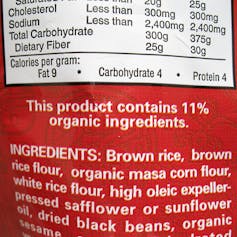Australian and New Zealand ministers responsible for food regulation last week bowed to lobbying from processed food manufacturers and agreed to permit them to market products with general level health claims without requiring pre-market or independent verification.
General level health claims are those that relate a food or an ingredient with a health benefit, such as “product X helps promote the strength of the immune system”.
The ministers’ decision came just over a week after the Australia Institute for Health and Welfare released its Australia’s food and nutrition 2012 report, showing approximately one in four Australian children and nearly two-thirds of adults are overweight or obese. Diet-related diseases including obesity cost the health system over A$16bn annually.
Public health and consumer organisations have expressed frustration with the ministers’ decision. They have been seeking leadership from government to establish policies to protect and promote public health. Instead, the ministers have effectively made it easier for food manufacturers to add to the cacophony of food marketing messages already presented to the public, contributing to dietary confusion and over-consumption.
Food manufacturers have welcomed the policy decision and argue it will help stimulate food product innovation and enable them to better promote the health benefits of their products to the public.
Why food and health information matters
Australians have poor food literacy. It is not uncommon for surveys to report that a proportion of respondents believe spaghetti grows in trees or that milk is made in a carton.
Against this context, the National Health and Medical Research Council’s (NHMRC) work in preparing and promoting the Australian Dietary Guidelines and the Australian Guide to Healthy Eating is especially important. These policy documents provide evidence-based and user-friendly food and health information for consumers to select a variety of “foundation” foods from each of the five food groups to achieve a healthy diet.

Health claims do not provide the same type of food and health information and merely focus on the benefits of individual nutrients or foods in isolation from the context of dietary balance, variety and moderation.
Experience shows that health claims are commonly exploited to promote the consumption of highly processed foods such as refined breakfast cereals and fruit drinks that are fortified with one or more nutrients.
Perversely, health claims are less accessible to foundation foods such as fruit and vegetables. As well as having fewer marketing resources available, these foods generally are not packaged and so are less able to display health claims.
Food regulation priorities
The self-regulation approach for general level health claims comes on the eve of the 21st anniversary of the nationally harmonised food regulatory system in Australia. Indeed, health claims was one of the first projects that the newly established food regulatory system inherited from the previous NHMRC system.
During its 21 years, the food regulatory system has constantly struggled with how to manage health claims and there have been many false starts in which proposals have been extended or replaced with new approaches.
Historically and internationally, health claims have been tightly regulated and, in many cases, prohibited. But a deregulation agenda has informed Australian and New Zealand food regulation reforms of the past decade.
Since 2008, food manufacturers have had access to a list of over 100 pre-approved food and health relationships that can be used as the basis of general level health claims. Now with a self-regulation approach, a number of public health challenges will arise that were able to be managed under a pre-approval approach:
The control of what, and when, general level health claims appear in the market place is largely at the discretion of food manufacturers. And they don’t have a strong track record of protecting public health with self-regulation approaches. Just think of the marketing of energy-dense, nutrient-poor foods to children.
Greater demands will be placed on the regulatory system to assess and enforce the health claims that appear in the marketplace.
There is less certainty for regulators, manufacturers and the public.
Ministers suggest that public health will be protected under a self-regulation approach because foods that contain high amounts of sugar, fat or salt will be disqualified from making claims. But how this protective measure will be enforced to prevent such products from appearing in the marketplace is not clear.
The primary objective for the food regulatory system is to protect public health and safety. Nevertheless, there are potential risks for public health associated with the ministers’ self-regulation approach for health claims. Clearly the winners from this policy decision are food marketers.
Curiously, the ministers’ decision comes at time when the Council of Australian Governments’ National Partnership Agreement on Preventive Health is investing A$872.1 million over six years in priority public health activities, including obesity prevention. There appears to be a disconnect between the policy activities of the food regulatory system and the public health priorities of other government sectors.
Next steps
There are two particular public health priorities that emerge from this policy decision. First, general level health claims will need to be monitored and evaluated so that a degree of accountability can be applied to the self-regulation approach.
Second, public health and consumer organisations will need to be on alert to identify if this policy decision is a one-off or a portent of a sweeping deregulation agenda across other food labelling activities.
Can the public be confident that the disqualifying criteria proposed as a protective measure to complement self-regulation will remain in place? Or will it be the next public health domino to fall under the deregulation agenda reforming the food regulatory system?

